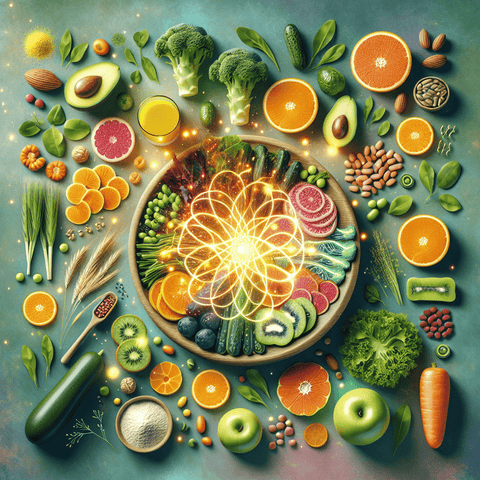Introduction
Energy is fundamental to human life, allowing us to perform daily activities, maintain mental focus, and enjoy a high quality of living. Vitamins play a crucial role in the body’s ability to produce and sustain energy. While they don’t provide calories like macronutrients such as carbohydrates, proteins, and fats, they help convert the food we eat into usable energy. As modern lifestyles often demand more from our minds and bodies, it’s no surprise that many individuals are turning to nutritional supplements to gain that much-needed energy boost.
From natural food sources to targeted supplements, certain vitamins are central to optimizing vitality. In this comprehensive guide, we’ll explore The top vitamins that give the most energy, how they work on a cellular level, and which forms—natural or supplemental—offer the most benefit. Whether you’re suffering from fatigue or simply want to elevate your daily performance, this article will help you understand which vitamin might be the energy-boosting solution you need.
Let’s dive into the science-backed benefits, best sources, and practical tips for integrating these powerful vitamins into your life for sustained energy and well-being.
1. Vitamins for Energy: An Essential Guide to Boosting Your Vitality through Nutritional Supplements
Vitamins are organic compounds essential for various metabolic processes. Although they do not directly supply energy like carbohydrates or fats, they play pivotal roles in facilitating biochemical reactions, especially in energy metabolism. When these processes run inefficiently due to vitamin deficiencies, the results can include fatigue, lack of focus, and reduced physical performance.
At a cellular level, the mitochondria—our cells' "power plants"—are responsible for producing ATP (adenosine triphosphate), the body’s primary energy currency. Vitamins such as B-complex play a leading role in ATP production. For instance, Vitamin B1 (thiamine) helps cells convert carbohydrates into energy, whereas Vitamin B2 (riboflavin) and Vitamin B3 (niacin) assist in mitochondrial function and oxidative phosphorylation.
There’s a difference between dietary vitamin intake and supplementation. While a balanced diet should ideally provide all necessary vitamins, modern diets, lifestyle choices, medical conditions, and aging can impair nutrient absorption or increase requirements. As a result, nutritional supplements can be an effective way to bridge the deficit.
Common signs of vitamin deficiencies that might be undermining your energy levels include:
- Persistent fatigue and low stamina
- Dizziness or lightheadedness
- Muscle weakness
- Brain fog and poor concentration
- Depression or reduced motivation
Among the many vitamins that support energy production, these are particularly notable:
- B-complex Vitamins: Help convert food into energy
- Vitamin D: Supports muscle function and helps prevent tiredness
- Vitamin C: Assists in reducing oxidative stress and supports the adrenal glands
- Iron: Essential for oxygen transport needed for energy (Note: iron is a mineral, but often included in energy-related discussions)
Vitamin supplementation helps in realigning the metabolic processes and restoring energy-consuming pathways, especially in conditions of stress, illness, or nutritional gaps. Understanding the underlying causes of low energy, identifying possible deficiencies, and choosing the right supplements can make a transformative difference in your day-to-day vitality.
2. Natural Energy Vitamin: Discovering the Power of B-Vitamins in Nature’s Pharmacy
When it comes to naturally enhancing your energy levels, B-vitamins are arguably the most important group. Known collectively as the B-complex, this group includes eight water-soluble vitamins that play critical roles in transforming the food we eat into usable energy.
The B-vitamins involved in energy metabolism include:
- Vitamin B1 (Thiamine): Helps convert carbohydrates into glucose
- Vitamin B2 (Riboflavin): Assists in electron transport and energy release
- Vitamin B3 (Niacin): Supports over 200 enzymatic reactions, especially in metabolic functions
- Vitamin B5 (Pantothenic Acid): Forms part of coenzyme A, vital for fatty acid metabolism
- Vitamin B6 (Pyridoxine): Involved in glycogenolysis—the breakdown of glycogen into glucose
- Vitamin B7 (Biotin): Coenzyme in metabolism of lipids and proteins
- Vitamin B9 (Folic Acid): Important for DNA synthesis, indirectly supporting cell energy
- Vitamin B12 (Cobalamin): Critical for nerve function and energy synthesis in red blood cells
Natural sources of the B-complex vitamins include:
- Whole grains like oats, brown rice, and barley
- Legumes including lentils, chickpeas, and black beans
- Animal proteins such as eggs, dairy, fish, and meat (especially for B12)
- Leafy greens like spinach, broccoli, and kale
One of the advantages of obtaining B-vitamins from whole food sources is bioavailability—the ease with which the body can absorb and utilize these nutrients. Moreover, food-based intake usually avoids the risk of toxicity that can come with high-dose supplements and includes other supporting nutrients and fiber.
B-vitamins are also heavily linked to mental function. Deficiencies, particularly in B12 and B9, are associated with fatigue, memory problems, and even depression. Ensuring an adequate intake either through diet or supplementation is crucial for maintaining mental clarity in addition to physical energy.
To easily boost your B-vitamin intake:
- Start your day with a whole grain breakfast
- Include a source of lean protein with every meal
- Incorporate a variety of vegetables, especially dark leafy greens
- Consider a high-quality B-complex supplement if dietary intake is insufficient
For those exploring nutritional supplements, consider Topvitamine’s energy formulations that often combine B-vitamins with other energy-supporting nutrients.
3. Best Vitamin Boosts Energy: Top Supplements to Elevate Your Energy Levels Effectively
Seeking out the best vitamin supplements for boosting energy can be overwhelming, especially with the wide array of options available. However, when chosen wisely and tailored to individual needs, vitamins can significantly improve overall stamina, mood, and alertness.
To determine the best energy-boosting vitamin, scientists rely on several factors:
- Scientific evidence of efficacy in energy production
- Ability to address common deficiencies associated with fatigue
- Bioavailability (how well the vitamin is absorbed)
- Safety and dosage guidelines
Here are the top vitamins, backed by research, that help in enhancing energy:
- Vitamin B12: Essential for red blood cell formation and neurological function. Found primarily in animal products and often deficient in vegetarians and older adults.
- Vitamin D: More than 1 billion people worldwide are deficient in vitamin D. Low levels are linked to chronic fatigue. You can explore supplements in the Vitamin D category at Topvitamine.
- Vitamin C: Supports adrenal function and combats oxidative stress, which can otherwise lead to fatigue. Check out Topvitamine’s Vitamin C supplements designed for vitality.
- Magnesium: Technically a mineral, but critical for ATP production. Deficiencies can result in chronic tiredness. For optimized magnesium intake, view Magnesium supplements from Topvitamine.
For many, multivitamins designed for energy and vitality are a practical convenience. Specifically formulated energy support complexes often contain a synergistic mix of B-vitamins, vitamin D, magnesium, and other nutrient co-factors like CoQ10 and alpha-lipoic acid to support mitochondrial energy production.
Scientifically validated supplements often prove more effective than cheap generic alternatives, due to better quality control, efficient absorption, and appropriate dosing. It’s essential to select products with third-party testing and quality certifications to ensure safety and effectiveness.
Different lifestyles require personalized supplementation:
- Busy professionals may opt for B-complex with Vitamin D
- Athletes could benefit from comprehensive multis with magnesium and adaptogens
- Vegans should supplement B12 regularly
- Seniors typically require Vitamin D and B12 due to absorption inefficiencies
4. Essential Vitamins for Vitality: The Foundation of Long-lasting Energy and Well-being
Vitality encompasses more than just bursts of short-term energy; it reflects the body’s ability to consistently perform physical, mental, and emotional duties effectively. Several key vitamins play major roles in ensuring this balanced state of health.
Vitamin D is essential not just for bone health but also for muscle performance and mood stability. Multiple studies have indicated that low vitamin D levels correlate with chronic fatigue syndrome. Supplementation, especially in regions with limited sunlight, can restore optimal levels. Discover quality options by visiting our Vitamin D product page.
Vitamin C is vital for the proper functioning of the adrenals, glands that manage our stress response. Chronic stress can deplete vitamin C reserves, leading to adrenal fatigue and reduced stamina. Including citrus fruits, bell peppers, and strawberries in your diet helps, or consider supplements from our Vitamin C range.
B-complex vitamins deserve repeated mention due to their multifaceted roles across energy-conversion pathways. As explored, a deficiency in any of these can trigger metabolic inefficiencies.
Other notable contributors to sustained energy include:
- Vitamin E: A powerful antioxidant protecting mitochondria from oxidative damage
- Vitamin K: While less direct, it contributes to cardiovascular health which in turn supports stamina; more information on benefits can be browsed in Topvitamine’s Vitamin K collection
Signs of deficiencies in these essential vitamins may include fatigue, compromised immunity, mood swings, and even difficulty sleeping—each feeding into a vicious cycle that lowers vitality.
To ensure adequate intake:
- Follow a balanced diet rich in fruits, vegetables, and whole grains
- Consider fortified foods or functional beverages
- Add high-quality supplements where dietary gaps persist
Energy and immune function are intrinsically linked. A well-fueled immune system prevents sickness, allowing you to carry out daily tasks without interruption. Thus, maintaining optimal vitamin levels is foundational for long-term vitality and resilience.
5. Energy-Boosting Vitamin Supplements: Combining Vitamins and Nutrients for Maximum Impact
Energy levels depend not only on individual vitamins but often on their synergistic combinations. Many successful formulations combine vitamins with minerals, amino acids, and botanicals to enhance absorption and effectiveness.
Let’s explore some powerful combinations for energy:
- B-complex + Magnesium: B-vitamins rely on magnesium as a co-factor for enzymatic energy reactions. View our high-demand magnesium and B-combo products here.
- Vitamin D + Omega-3 (DHA/EPA): Combining omega-3 fatty acids with vitamin D supports brain energy and mood. High-purity options are available from our Omega-3 collection.
- Vitamin C + Adaptogens (e.g., Rhodiola or Ashwagandha): Effective against stress-induced fatigue, though adaptogens are subject to local regulations.
The bioavailability of these supplements depends significantly on the forms used. For instance, methylcobalamin is preferred over cyanocobalamin for B12 due to its superior absorption. Likewise, magnesium glycinate or bisglycinate forms are more gentle and bioavailable than the commonly used oxide form.
Best practices for energy supplementation include:
- Taking vitamins with meals to boost absorption
- Scheduling doses earlier in the day to avoid sleep interference
- Using trusted brands that offer lab-certified products
Consumers should cautiously approach “energy boosters” that contain stimulants. Unlike vitamins, substances like caffeine or yohimbine may offer short-term solutions but often come with side effects or dependency issues. Vitamins are safer, more sustainable routes for restoring energy at the biological level.
Finally, consider the importance of batch-tested, GMO-free, and allergen-controlled formulations. These ensure not just energy optimally but health sustainability over the long term.
6. Vitamins to Combat Fatigue: Targeted Nutrients to Fight Exhaustion and Restore Energy
Fatigue is a common complaint, particularly in modern life, and may stem from poor sleep, stress, chronic disease, or inadequate nutrition. Several vitamins are particularly effective in addressing nutritional fatigue when other causes are ruled out.
Vitamin B12 deficiency is a leading cause of fatigue, especially in older adults and vegans. It supports the formation of red blood cells and neurological functions involved in alertness.
Vitamin D is increasingly recognized as a contributor to fatigue. Its role in the regulation of calcium homeostasis and muscle function influences both energy and strength. Supplementation has shown positive effects in clinical trials on reducing fatigue symptoms in individuals with low levels.
Iron plays a role in hemoglobin function, transporting oxygen in blood, although it's technically a mineral, not a vitamin. Deficiencies cause iron-deficiency anemia, leading to profound exhaustion. It should only be taken under supervision due to potential for iron overload.
Magnesium is key to mitochondrial health and energy synthesis. If your fatigue is unexplained, magnesium deficiency could be a factor.
Signs you may need targeted vitamin supplementation:
- Always tired despite adequate sleep
- Pale skin or cold hands and feet (possible anemia)
- Frequent infections (suggesting low immune-vitality)
- Mood instability
- Brain fog or reduced memory retention
Case studies have shown success using a combination of B12, Vitamin D, and magnesium to restore vitality. However, before supplementation, it is advisable to consult with a healthcare professional for blood tests and tailored dosages, especially in cases of persistent fatigue.
Conclusion
After detailed examination, the answer to "Which vitamin gives the most energy?" undoubtedly points to the B-complex vitamin family, with Vitamin B12, B6, and others playing critical roles in energy metabolism. However, optimal energy requires a holistic approach—incorporating vitamin D, magnesium, and vitamin C to support interconnected bodily systems.
Energy vitamins work best when combined with a nutrient-rich diet, lifestyle changes, and high-quality supplements. Whether you are a busy professional, a health-conscious individual, or someone tackling chronic fatigue, prioritizing your vitamin intake is a wise investment in your energy and well-being.
Explore the scientifically supported formulations available at Topvitamine to bridge dietary gaps and elevate your daily vitality.
Q&A Section
Which vitamin gives the most energy?
B-Vitamins, particularly B12 and B6, are most commonly associated with enhancing energy by supporting cellular metabolism and red blood cell production.
Can vitamin D help reduce fatigue?
Yes. Low levels of vitamin D are linked with feelings of tiredness, and supplementation can help improve energy, especially in deficient individuals.
What are signs of a vitamin deficiency affecting energy?
Common symptoms include fatigue, muscle weakness, poor concentration, irritability, and low motivation.
Is it better to get vitamins from food or supplements?
Whole foods are ideal, but supplements are beneficial for addressing deficiencies, lifestyle demands, or poor nutrient absorption.
How can I find high-quality energy supplements?
Look for products tested for purity and potency. Browse specialized collections like Vitamin C, Vitamin D, and Magnesium on Topvitamine.com.
Important Keywords
- Best vitamin for energy
- Natural energy vitamins
- B-complex benefits
- Vitamin D for fatigue
- Energy supplement recommendations
- Vitamins that combat tiredness
- Top energy-boosting vitamins
- Vitamin C immune and energy support
- Magnesium for energy
- High-quality vitamin supplements



